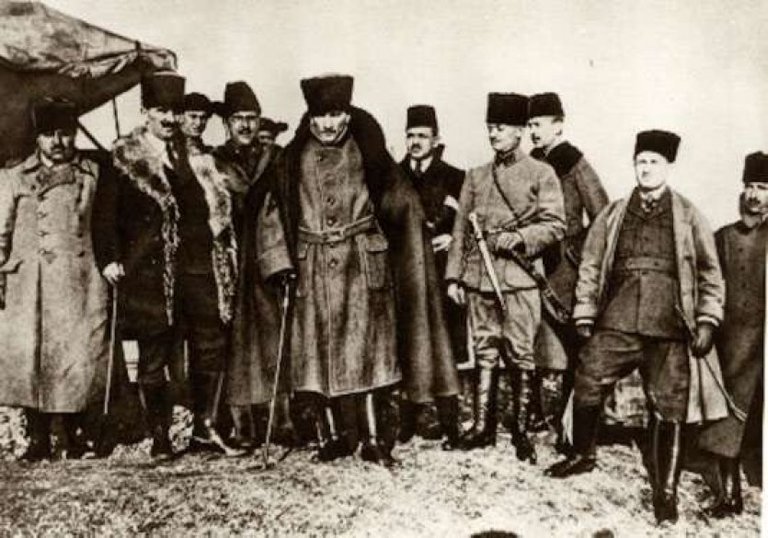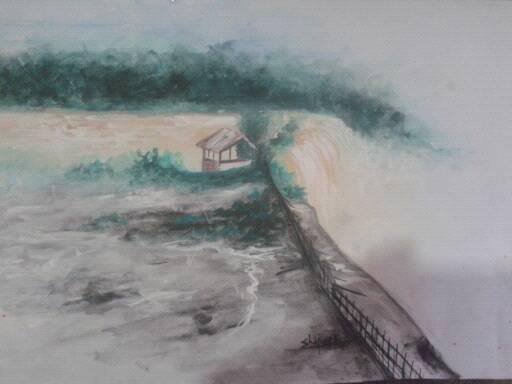The Greek army marched again on 13 August 1921 towards the Turkish positions in Sakarya. On August 15, 1921, the Greek king Constantine gave his armies the order "to Ankara! The Greeks, who marched without halt, occupied some Turkish cities and provinces and finally reached Sakarya.
On August 23, 1921, the battle at Sakarya Square began with the attack of the Greek army. The Greek attack was stopped by the Turkish troops in many parts of the front, which caused heavy losses to the enemy. However, there were moments when the increased Greek troops conquered some important positions of the Turks. They approached Polatlı and heard the bullet sounds in Ankara. Although the Turkish positions were split at many points, each point was stubbornly defended, so that behind each lost line a new line of defense emerged so that the Greeks could not advance.
On August 26, 1921, the commander-in-chief Mustafa Kemal Pasha ordered the troops to pursue a war strategy:
"There is no line of defence, there is an area defend. This area is our home! The area of our homeland cannot be given up unless it is saturated with the blood of the fighters. Each of our fighters can be deployed anywhere and must be deployed anywhere where he is needed. Each fighter must stand up for the other and fill the gaps of the other. All fighters will form units and when one unit is disbanded, new fighters will form units to support the other units. It is not up to the fighter if the unit next to him retreats to regroup. For this to happen, the fighter must resist the enemy with his unit until a new unit is formed. The fighter will fight to the end in his current position and will resist the enemy."
These words spoken by the commander-in-chief Mustafa Kemal Pasha to the Turkish army were very important in the warfare and of great importance. The army practiced this rehearsed and improvised strategy in Sakarya to defend the sacred homeland to the end. The army formed defensive lines without losing any lost line. This method of defense was very effective and resistant to the enemy.
After each hill the Greek troops shouted: "Ankara is before us".
Mustafa Kemal Pasha, with his strategy, drew the Greek troops to the holy hearth of the country where he wanted to give the final blow against the enemy. With further fighting the battle the attack strength, the ascent strength and possibly the motivation of the enemy went out. The Greek troops were far from their main positions and had indeed fallen into the holy hearth of the Turks. Just as the commander-in-chief Mustafa Kemal Pasha wanted it. Now it was the Turks' turn to attack.
On September 10, 1921, the Turkish counterattack caused heavy losses to the enemy. The commander-in-chief Mustafa Kemal Pasha, who had not left the front during the whole war, had occasionally appeared in the most advanced positions and had even reached the lines of fire. Mustafaa Kemal Pasha, who was always at the army line that was the most advanced and where the enemy was sitting on the Turk's neck, always watched very closely what was going on and gave orders and commands to his soldiers on the spot. This circumstance, that the commander-in-chief controlled on the fightline with his soldiers the whole thing, motivated the Turks more and more and they were strengthened by it.
This great and bloody war, called "the Battle of Sakarya", lasted 22 days and 22 nights. Finally, the Greeks were defeated in the east of the Sakarya River on September 13, 1921, and the Turks won a great victory. This was a significant moment in the history of the Turks and September 19, 1921 the commander-in-chief Mustafa Kemal Pasha was awarded the rank of Marshal by the Great National Assembly of Turkey on the great success by law and was honored with the title"Gazi".
The victory at Sakarya soon became apparent on a political level.
On 13 October 1921 the Treaty of Kars was signed with the Caucasian republics and on 13 October 1921 the Treaty of Ankara was signed with the French.
After the Battle of Sakarya, the defeated Greeks withdrew to the Afyon-Seyitgazi-Eskişehir line. They had defended their positions by reinforcing their positions and they built fences, and at each of them they had placed three corps at every line. The Greeks had to be expelled from these positions so that the Turkish army could win the final war. This was only possible if the enemy was completely expelled from Anatolia.
The Greeks, who had the full support of the British, watched the whole thing happen. With the difficulties of the Turkish government, the economic crises with which the Turks had to struggle, and the losses that the Turks carried with them, the Greeks, under the leadership of the British, assumed that the Turks could not hold out for long. The British considered it impossible for the Turks to unite against theirselves in Anatolia and expected that the Turkish army would inevitably seek peace after some time. For this reason they did not approach peace at first and thought that the occupied places in their hands would save them time and make the situation more profitable for them.
The commander in chief Mustafa Kemal Pasha knew the tactics of the British from his military studies from his education and gave no second of waste. He pursued the plan to carry out a great attack but kept the strategy, tactics, location and time secret. He had the opinion that half worked out and half executed was only half won and that definily would lead to a defeat.
Then, finally, it was decided that all the material and immaterial forces of the country were aimed at the same end with all the means at their disposal, and it was decided that the time of the attack came. The Greeks, however, maintained their superiority in terms of number of soldiers and equipment.
The Great Attack, prepared down to the smallest detail by the Commander-in-Chief Mustafa Kemal Pasha for the battle, was announced to the army commanders who were called to Aksehir on the night of 27-28 July 1922.
After Mustafa Kemal Pasha had discussed everything with the army commanders, they were ordered to prepare their forces for the attack on August 6, 1922.




 Part 16
Part 16.png)

you are also a Hero
greate article @ oendertuerk
Yazı dizinizi beğenerek takip ediyorum. Bu paylasimlariniz için teşekkürler.
Great biography write-up.
nice, sir
this my water colur painting
nice work
You got a 61.04% upvote from @ocdb courtesy of @oendertuerk! :)
@ocdb is a non-profit bidbot for whitelisted Steemians, current max bid is 60 SBD and the equivalent amount in STEEM.
Check our website https://thegoodwhales.io/ for the whitelist, queue and delegation info. Join our Discord channel for more information.
If you like what @ocd does, consider voting for ocd-witness through SteemConnect or on the Steemit Witnesses page. :)
Hi, @oendertuerk!
You just got a 1.53% upvote from SteemPlus!
To get higher upvotes, earn more SteemPlus Points (SPP). On your Steemit wallet, check your SPP balance and click on "How to earn SPP?" to find out all the ways to earn.
If you're not using SteemPlus yet, please check our last posts in here to see the many ways in which SteemPlus can improve your Steem experience on Steemit and Busy.